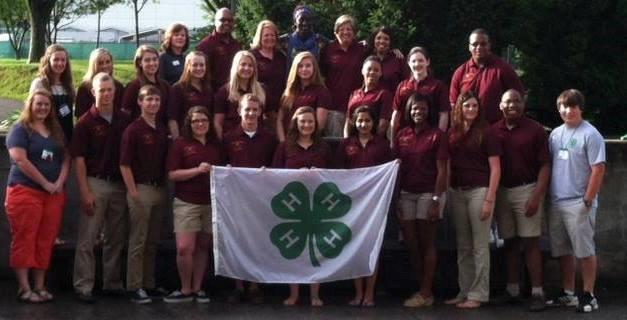
Changing Lives One at a Time
“4-H in America – Clovers’ lovers – Great people, they are not angry. They are not judgmental. They are not unkind. They are not nasty. They are brilliant. They are loving. They are kind. They are generous. They are strong. They are passionate. They are gentle. They are peaceful. They are full of laughter, full of good cheer. They are generous, lavish, and they love a good fight. They will contend for what is ours, but they will contend with joy!
The Best Place I never dreamed of…. May God Bless you and help the world get to where you are.”
~ Bineta Khalla Guisse
Bineta Khalla Guisse from Senegal Africa sent the above message after she visited Virginia May 27 – June 20, 2013 to learn about the Virginia 4-H Youth Development program as she is interested in starting 4-H in her country.
During her visit, she spent a few days with Kaci Daniels, Extension Agent 4-H Youth in Orange county participating in 4-H Camp Counselor Training and learning about Virginia Cooperative Extension programming. She attended a Virginia 4-H Strategic Planning session observing the group process learning about people working together for a common goal. Spending a week at the Henry County/City of Martinsville 4-H Camp with Brian Hairston, Extension Agent, 4-H Youth, she observed Teen Counselors and Adult Volunteers putting their training into action while working with the campers. She participated in camp classes, interacted with the campers, teens and adults and had an unforgettable experience. In June, she participated in Virginia 4-H Congress working with the 4-H Cabinet learning what happens behind the scenes, staying in the dormitories with the delegates, participating in workshops, observing presentation contests, and experiencing all aspects of 4-H Congress. 4-H Agents Linda King, in Prince William County, Rita Schalk in Hanover County, Michelle Dickerson, in Montgomery County and Sonya Furgurson, in Halifax County hosted Bineta at various times during 4-H Congress sharing about the 4-H program and our culture while learning about her interests and her culture. Bineta interacted with 4-H teens, 4-H agents, 4-H volunteers and parents learning while sharing. At the end of the 4-H Share the Fun show, Bineta shared about her culture by performing an African dance on the Burruss Hall stage for all of the Congress delegates.
After her return home, Bineta remarked, “You were remarkable! I have learned so many things from every one of you… I must admit that I owe you and so does my country! Thinking of you makes me feel strong because you made me a new person…and I can feel the difference!” “I really do not think I will forget this for the rest of my life.”
Bineta is currently working with the College of Agriculture and Life Sciences faculty and students to help Senegal farmers learn conservation practices to maximize their resources. On December 28, 2013 a delegation of College of Agriculture and Life Sciences faculty and students left Virginia to assist with farming practices in Senegal villages. In addition, the college students will engage the youth in some 4-H hands-on activities.
Bineta is the current Gender and Community Outreach Officer specializing in strategic planning and organizational policy development/implementation with a focus on innovative approaches to securing child wellbeing and women’s empowerment through education and micro enterprises.

